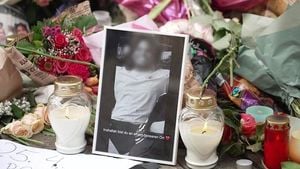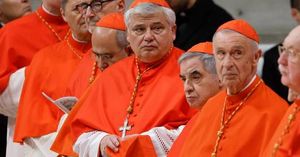AC Milan faced Dinamo Zagreb at the Stadion Maksimir on January 29, 2025, with hopes of securing their place among Europe's elite by qualifying for the knockout stage of the UEFA Champions League. The match held significant weight, affecting not only Milan's standings but also the morale of key players Rafael Leao and Theo Hernandez.
Before kick-off, the pressure was palpable. "We want to finish this phase in the best possible way; we have the responsibility of representing AC Milan," said Sergio Conceicao, head coach of the Rossoneri. With their recent form showing promise—having won five consecutive matches—the stakes were high for the players stepping onto the pitch.
Competing against Dinamo Zagreb, under the guidance of Fabio Cannavaro, Milan was aware they would need to navigate gaps left by injuries and suspensions. Key players Davide Calabria and Emerson Royal were unavailable, forcing Conceicao to adapt his lineup strategically. Addressing the pressing need for defensive solidity, Fikayo Tomori transitioned to right-back, leaving Matteo Gabbia and Strahinja Pavlovic to anchor the center. "With Conceição, I have the feeling AC Milan are expecting more and have real bite," stated Cannavaro, acknowledging the challenge laying before his squad.
The match kicked off with both teams eager to assert dominance. Milan’s attacking trio of Pulisic, Leao, and Alvaro Morata was expected to be pivotal. The Rossoneri’s early efforts bore fruit, with Pulisic scoring to bring the match to level terms after Dinamo's opener. Despite this, defensive lapses would haunt the visitors.
Throughout the match, key moments unfolded rapidly. An early red card for Yunus Musah proved fatal for Milan, altering the dynamics drastically. His dismissal, criticized as reckless, not only diminished their numbers on the field but also shifted the momentum firmly with Dinamo. The home crowd grew animated, feeding off their team's newfound vigor.
AC Milan’s defensive setup faltered as the match progressed; the interplay between Tomori and Gabbia lacked the cohesion necessary to fend off Dinamo's attacks. Player ratings showcased the struggles, particularly for Musah, who received the lowest mark of the match for his early forced exit and overall performance. Maignan received a respectable six for his efforts, though much of the blame for the goals conceded fell within the defensive unit.
Leao, who had been capable of brilliance, struggled to find spaces against Dinamo’s organized backline. Despite some promising individual efforts, his contribution was left wanting, as reflected by his rating. When opportunities arose, such as putting the ball past the goalkeeper or creating chances, the finishing was often tepid. Even with one clear goal disallowed, his performance seemed overshadowed by the team’s overall inability to control the flow of the game.
The climax of the evening materialized with Dinamo putting the match out of reach with two goals, sending Milan to face questions of their strategy and player contributions heading forward. Reports shortly after the defeat indicated concerns over Hernandez’s form, who continues to face challenges amid pressure.
After the final whistle, pundits and fans alike debated the results, assessing Milan's chances for progression and what steps needed to be taken moving forward. The loss not only impacted standings but cast shadows over player decisions—including Hernandez's upcoming contract renewal discussions.
With AC Milan's Champions League aspirations proving tumultuous, the team must now regroup swiftly. Onlookers await to see how they bounce back domestically and within Europe, fostering hopes for recovery as they prepare for subsequent matches. The struggles illustrated tonight spotlight the arduous road still needed to pave their return to true elite status.
From the highs of anticipation to the lows of defeat, the match encapsulated the relentless drama of football, detailing not just tactics and formations but the palpable hunger for success. With the Champions League still offering valuable lessons, both teams will need to adapt, reflect and strive to claim the opportunities remaining.



